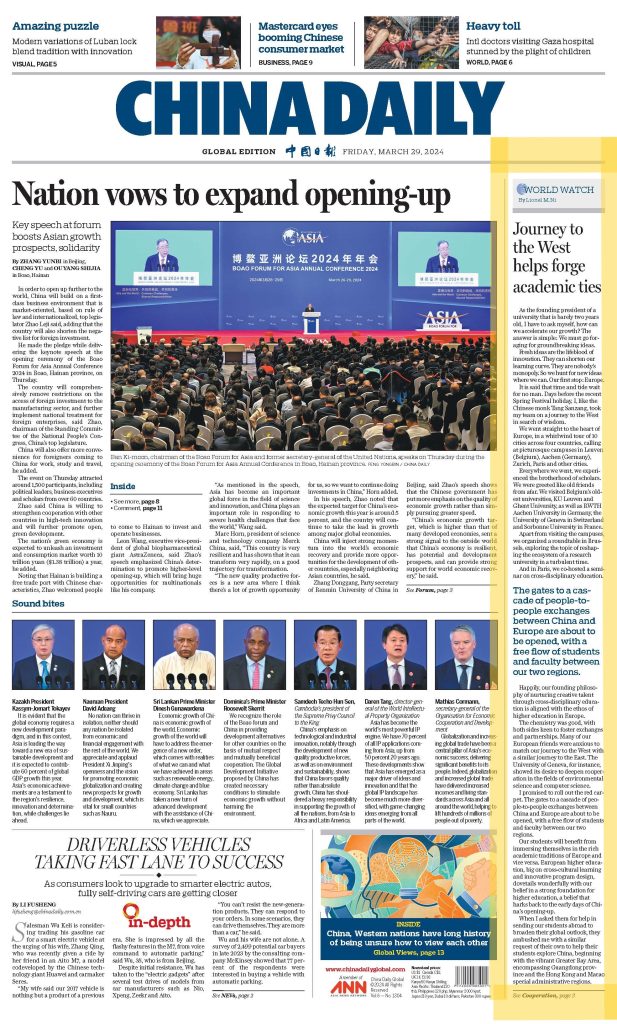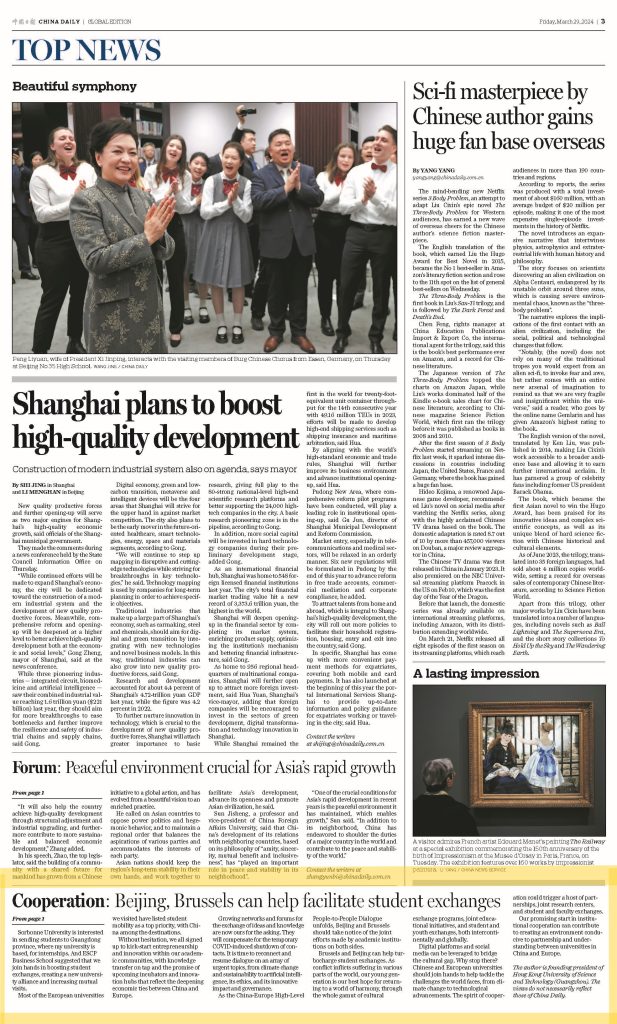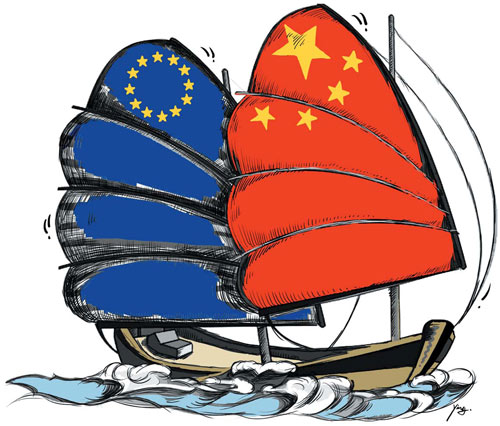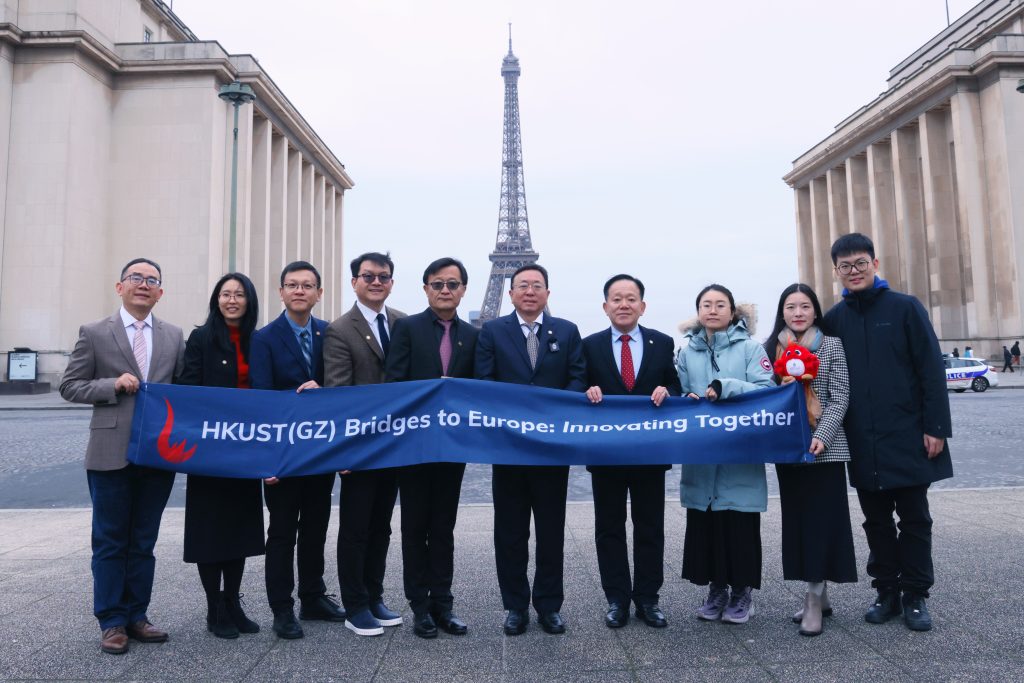《中国日报国际版》头版发表倪明选校长评论文章《Journey to the West helps forge academic ties》
编者按
今年春节前夕,香港科技大学(广州)开展了创校以来的首次大型出访活动,校长倪明选教授率团访问比利时、德国、瑞士和法国,拜访多所高水平大学和联盟组织,举办中国-欧盟高等教育圆桌会议、中法交叉学科高级别研讨会等学术交流会议,与200多位校长、教授、学生和各界精英面对面,搭建合作之桥、塑造伙伴关系。此次出访是港科大(广州)为建设全球朋友圈,高质量推进国际化进程迈出的第一步。
今日,正值中欧高级别人文交流对话机制(HPPD)第六次会议举行,为期四天的博鳌亚洲论坛2024年年会也刚刚落下帷幕,《中国日报国际版》刊载了香港科技大学(广州)校长倪明选教授的评论文章,题目为《Journey to the West helps forge academic ties》。文章讲述了倪明选校长为加速学校的成长,带领团队前往欧洲寻找创新思想的经历,并阐述了加强中欧大学、师生之间交流合作,共同解决全球面临的挑战的重要性。全文转载如下。


page 001 & 003
Journey to the West helps forge academic ties
By Lionel M. Ni
As the founding president of a university that is barely two years old, I have to ask myself, how can we accelerate our growth? The answer is simple: We must go foraging for groundbreaking ideas.
Fresh ideas are the lifeblood of innovation. They can shorten our learning curve. They are nobody's monopoly. So we hunt for new ideas where we can. Our first stop: Europe.

It is said that time and tide wait for no man. Days before the recent Spring Festival holiday, I, like the Chinese monk Tang Sanzang, took my team on a journey to the West in search of wisdom.
We went straight to the heart of Europe, in a whirlwind tour of 10 cities across four countries, calling at picturesque campuses in Leuven (Belgium), Aachen (Germany), Zurich, Paris and other cities.
Everywhere we went, we experienced the brotherhood of scholars. We were greeted like old friends from afar. We visited Belgium's oldest universities, KU Leuven and Ghent University, as well as RWTH Aachen University in Germany, the University of Geneva in Switzerland and Sorbonne University in France.
Apart from visiting the campuses, we organized a roundtable in Brussels, exploring the topic of reshaping the ecosystem of a research university in a turbulent time.

And in Paris, we co-hosted a seminar on cross-disciplinary education.
Happily, our founding philosophy of nurturing creative talent through cross-disciplinary education is aligned with the ethos of higher education in Europe.
The chemistry was good, with both sides keen to foster exchanges and partnerships. Many of our European friends were anxious to match our journey to the West with a similar journey to the East. The University of Geneva, for instance, showed its desire to deepen cooperation in the fields of environmental science and computer science.

I promised to roll out the red carpet. The gates to a cascade of people-to-people exchanges between China and Europe are about to be opened, with a free flow of students and faculty between our two regions.
Our students will benefit from immersing themselves in the rich academic traditions of Europe and vice versa. European higher education, big on cross-cultural learning and innovative program design, dovetails wonderfully with our belief in a strong foundation for higher education, a belief that harks back to the early days of China's opening-up.
When I asked them for help in sending our students abroad to broaden their global outlook, they ambushed me with a similar request of their own to help their students explore China, beginning with the vibrant Greater Bay Area, encompassing Guangdong province and the Hong Kong and Macao special administrative regions.
Sorbonne University is interested in sending students to Guangdong province, where my university is based, for internships. And ESCP Business School suggested that we join hands in boosting student exchanges, creating a new university alliance and increasing mutual visits.

Most of the European universities we visited have listed student mobility as a top priority, with China among the destinations.
Without hesitation, we all signed up to kick-start entrepreneurship and innovation within our academic communities, with knowledge transfer on tap and the promise of upcoming incubators and innovation hubs that reflect the deepening economic ties between China and Europe.
Growing networks and forums for the exchange of ideas and knowledge are now ours for the asking. They will compensate for the temporary COVID-induced shutdown of contacts. It is time to reconnect and resume dialogue on an array of urgent topics, from climate change and sustainability to artificial intelligence, its ethics, and its innovative impact and governance.
As the China-Europe High-Level People-to-People Dialogue unfolds, Beijing and Brussels should take notice of the joint efforts made by academic institutions on both sides.

Brussels and Beijing can help turbocharge student exchanges. As conflict inflicts suffering in various parts of the world, our young generation is our best hope for returning to a world of harmony, through the whole gamut of cultural exchange programs, joint educational initiatives, and student and youth exchanges, both intercontinentally and globally.
Digital platforms and social media can be leveraged to bridge the cultural gap. Why stop there? Chinese and European universities should join hands to help tackle the challenges the world faces, from climate change to technological advancements. The spirit of cooperation could trigger a host of partnerships, joint research centers, and student and faculty exchanges.
Our promising start in institutional cooperation can contribute to creating an environment conducive to partnership and understanding between universities in China and Europe.




